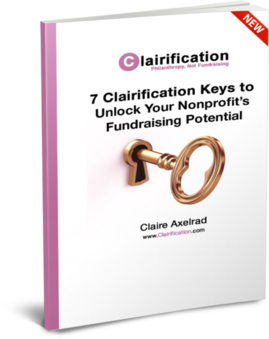 In my last article I talked about how to pitch yourself for a new job. My focus was on fundraising jobs, but it’s a paradigm you can use for any time you’re trying to make a persuasive case for yourself.
In my last article I talked about how to pitch yourself for a new job. My focus was on fundraising jobs, but it’s a paradigm you can use for any time you’re trying to make a persuasive case for yourself.
Today I’d like to get to the part where you’ve transitioned from “selling” to the interviewer, and have arrived at the part where they sell to you. In other words, it’s your turn!
It’s important to prepare for this part of the interview. And, if you happen to be wearing the interviewer hat, you can use these tips to listen for important questions that will tell you a lot about your potential hire.
The Purpose of Question Time
Definitely come prepared with what you want (and need) to know to make a wise, informed decision. You’ll want to ask about this organization’s history, its programs, its culture (don’t overlook this one!), this position, and the person(s) for whom – and with whom — you’ll be working. Think about what success would look like for you, and probe to assure the pre-conditions to achieve that success are in place.
The interview is as much an opportunity for the candidate to get to know the hirer as it is a chance for them to get to know you. There’s little point in selling yourself for a job you ultimately don’t want and won’t enjoy. Where you’ll just be spinning your wheels. Where you won’t have a chance to grow professionally. Life is too short.
POINT OF PERSPECTIVE: I’ve interviewed a lot of candidates in my day. And, truth be told, if they don’t avail themselves of this opportunity to ask questions I really wonder about them. How can they be so lacking in curiosity? Did they not prepare for this conversation? How are they going to learn things on the job so they don’t just do things the right way, but do the right things? If it’s a front-facing fundraiser position, how are they going to be when faced with the opportunity to build a relationship with a donor?
When I’m in hiring mode, I don’t need a broadcaster as much as a relationship builder. I don’t need someone who boasts ad nauseum about themselves as much as need someone who probes for my interests, needs and challenges. So, if you’re the hirer, listen to see how many of these questions your candidates ask; be prepared to answer these questions.
Top 20 Interview Questions
When I’ve interviewed, I always made sure to avoid any hidden traps by asking the following questions. As an interviewer, I listened for these inquiries. You don’t have to ask them all, but you do need to come prepared with a list of thoughtful interrogatories.
IMPORTANT CAVEAT: Show you pay attention. If in the early part of the interview the employer has already answered some of these questions, do not ask them again! If some of these questions are answered on the organization’s website or in their 990, don’t ask! It makes you look like you don’t listen, or that you don’t know how to do basic research typically expected in advance of an interview. It’s fine to wrap what you’ve heard or read into another question, however. For example, you might say: “I understand your total budget is $22 million. What percentage of that comes from fundraising?” “I hear your recent fundraising event was a huge success. I’m wondering what type of follow-up do you typically do after an event to assure relationships continue to be built with attendees?”
It’s great to show how you think, and how you’ll integrate what you’ve learned into future plans of action.
Okay – on to the questions I find most useful!
- How large is your organization’s budget, and what percentage must come from contributions?
- How do contributions break down by campaign (e.g., individuals; foundations; businesses; events, planned giving, etc.)
- How many donors do you have?
- What do you consider a “major gift” and how many are you getting?
- How large is your board and how much is your board donating?
- How are board members involved in fundraising?
- What is your board calendar and how often is development on the agenda? Would I attend meetings?
- Would I staff one or more committees?
- What do you use for a donor database? CRM? Who knows how to use these?
- What do you use for your website and fundraising landing pages platform? Who knows how to use these?
- Do you have a written strategic plan for development (fundraising and marketing)?
- What is your strategic planning process? How is development involved?
- How are fundraising and marketing integrated (formally and informally).
- What is your marketing budget to acquire new donors?
- What is your cultivation and stewardship budget to renew and upgrade ongoing donors?
- What percentage of the E.D.’s time is spent on fundraising? Ideally, would this become more or less?
- What kind of staff support is available to this position? To the E.D.? To the board and other volunteers?
- What are your top challenges? (Ideally, once the interviewer lets you know what keeps them up at night, you can offer a glimpse as to how you might address the challenges they’ve highlighted).
- Do you believe any of your top income sources are threatened in the next few years?
- What would be the goal for my first year? What would success look like for you?
You don’t have to memorize these questions! It’s perfectly acceptable to bring them on a notepad to which you refer during the interview. Personally, as an interviewer, I like seeing people come prepared.
Don’t Listen Just for What You Want to Hear
Thoughts for applicants:
Resist the temptation to sell, sell, sell. You’re a buyer too. If you’re good, they’ll be lucky to get you. So, ask questions that reveal more about the merchandise. Kick the tires. Look underneath the hood.
EXAMPLE: Sometimes you’ll only see the tip of the iceberg. It may look good, but your questions may reveal something funky or alarming going on beneath the surface. If the E.D. tells you they spend “a lot” of time fundraising, find out what this means. Do they meet with people face-to-face, or write grant proposals? Do they think five hours a week is a lot? If you’re told the board is “very committed,” don’t assume this extends to their role as fundraisers. Or even as donors! Probe more. This is your time!
Don’t blow your opportunity to find out what’s lurking in the closet or swept under the rug. Consider in advance what would be a red flag for you. Prepare questions to help you find the flags.
Thoughts for employers:
Nice goes only so far. Just because the candidate seems like a nice person is not reason enough to hire them for a job that requires broader, more strategic skills. It’s easier to spend a few more months now without a hire than to invest a year in someone; then be right back where you started a year from now. Per researcher Penelope Burk, this costs you an average of $127,650 per person. – and that was over a decade ago, so it surely costs even more now.
TRUE STORY: My boss once overruled me on a hire for a key position. This individual was a real “yes person,” and my boss LOVED them in the interview. I wasn’t so sure. I’d asked some questions about how they followed through on projects, and got some generic answers. They were a great politician! Long story short, we hired them and they proceeded to drive me nuts. There wasn’t an ounce of follow-through in this person’s DNA! Feel-good promises were made, reassurances were offered, and people loved them. Yet, from my manager’s perspective, nothing got done! I had to assign other staff to pick up the slack. This wasn’t fair, nor was it efficient. When it was time for this person’s contract renewal, I told my boss it was time to say good-bye. I was more than ready to let go; my boss was not! What did I do? I told my boss if they wanted to keep this employee so much they could take over as their supervisor. It took my boss a full additional year – now in the position of managing this individual – to cut them loose. It turns out – love isn’t all you need!
The right people are out there! Keep looking. And be prepared to spend money to make money. If you want double- or triple-digit growth, budget for additional staff, expenses for travel, database improvements, training, etc., and make sure your leadership are committed to the process.
Development is a profit center, not a cost center. If you’re pennywise and pound-foolish here, you’ll raise only pennies on the dollar.
One General Note of Caution for All
Don’t act out of desperation.
When negative emotions like fear kick in, people don’t make the best decisions. Try to take a breath or two or three, and give yourself some space to calmly consider your needs and options.
If you rush to a decision, taking the first job – or hiring the first person — who comes along, you’re most likely just kicking the can down the road. If your gut tells you this isn’t the right fit, it probably isn’t. Pay attention to red flags.
Trying to make a chicken out of a fish never works.
What else could you do right now to give yourself some time, space and other resources to let a little bit more patience and optimism lead? It’s worth it to spend a bit more time now doing your due diligence to find that match made in heaven. Otherwise, you know where you’ll wind up instead? It’s that place where the road to it is paved with good intentions.
Don’t go there!
It takes work, and a hefty dose of optimism, to find the right employer/employee match. It’s not something you can wing, either as the interviewee or interviewer. Know what you’re looking for, and build a plan to get there. Then… diligently work that plan!
“Plans are just good intentions unless they immediately degenerate into hard work.”
— Peter Drucker
Want to Put in Place all the Pre-Conditions for Fundraising Success?
 Get the 7 Clairification Keys to Unlock Your Nonprofit’s Fundraising Potential.
Get the 7 Clairification Keys to Unlock Your Nonprofit’s Fundraising Potential.
Unlock your nonprofit’s fundraising potential through a series of “clairifying” worksheets and individual and group exercises. (1) Values. (2) Stories. (3) Brand. (4) Social Channels. (5) Support Constituencies. (6) Engagement Objectives. (7) Resources and Systems. This 42-page guide will give you fresh insights into how fundraising and marketing have changed – and what that means for you and your organization.
All Clairification products come with a 30-day, no-questions-asked, 100% refund guarantee. If you’re not happy, I’m not happy.
Photo by Anna Tarazevich on Pexels.





